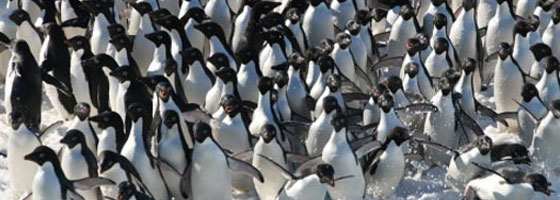Arctic penguin research sheds light on climate change

The Ross Sea is one of the few remaining areas of ocean to remain unharmed by human activity. Without invasive species, overfishing, or pollution, it is considered truly pristine. For this reason, it is an extraordinary laboratory for scientists to learn how untouched ecosystems function.
An international team of researchers has traveled to Ross Island to study colonies of Adélie penguins. They are investigating the penguins’ foraging habits and how they are coping with climate change.
With rich existing data sets, these penguin colonies provide a unique opportunity for understanding climate change’s impact. There has been extensive field research on penguin colonies here, as well as a 45,000 year-old record of bones and egg shells sealed within frozen deposits.
Researchers are using several advanced technologies to monitor the birds, including computerized weigh bridges, satellite telemetry, GPS, and microchips that identify individual penguins.
The research team is also using Vaisala WXT520 multi-parameter weather sensors from Fondriest Environmental to monitor weather conditions closely in the area around the penguin colonies.
The WXT520 is a compact weather measurement device with no moving parts that simultaneously measures wind speed and direction, liquid precipitation, barometric pressure, temperature, and relative humidity.
With this combination of data, scientists are able to examine how penguin populations are influenced by food sources, habitat, competition, and climate. The information they learn on this remote arctic island could provide valuable insight into how climate change will eventually affect life elsewhere on the planet.
To learn more about the research project, visit http://penguinscience.com.





0 comments